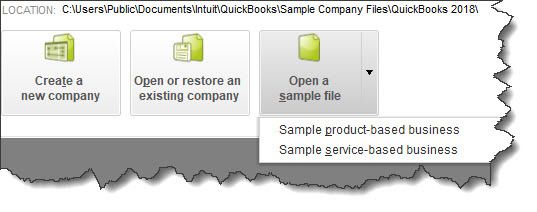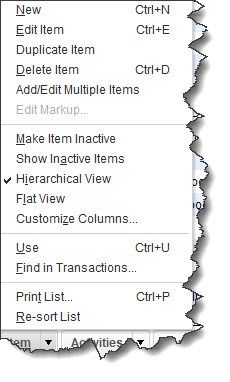New to QuickBooks? Try These Five Activities
Tackling any new piece of software can be daunting. Add a complex process like accounting to the mix, as QuickBooks does, and you may feel apprehensive about your ability to learn how to use it.
But QuickBooks was designed for small business people, not for accountants or technical wizards. It uses familiar language and forms, and it works like other Windows programs. That doesn’t mean, though, that you’ll be able to just jump in and start completing your accounting tasks.
Once you’ve created your company file, here are five steps to familiarize yourself with QuickBooks to get the software up and running in no time. Of course, if you need help creating a company file, don’t hesitate to call.
1. Open a sample file.
While you’re exploring QuickBooks, it’s a good idea to work with a sample file. That way, you can look around and practice without risking compromising your company file. You’ll be able to see how completed records and transactions should look and try your hand at entering sample data of your own.

Figure 1: QuickBooks comes with sample files that allow you to practice entering data without harming your own company file.
Before you open a sample file, you’ll need to close your current company. Click on File in the upper left to open that menu and then select Close Company. A window will open that should have your company file in its list. Below that, you’ll see three boxes containing different options. Click on the down arrow next to Open a sample file, as pictured above (this may look slightly different in your version). Choose the one you want to open and click on it. QuickBooks will load again with that file open. When you’re done looking at the sample file, go to File | Close Company again. The No Company Open window should appear again. Click on your company file name and then on Open to return to your file.
2. Learn where your lists are.
You’ll be storing a great deal of information in lists. QuickBooks maintains these automatically sometimes when you enter information in a record or transaction. For example, when you create a record for a product or service you sell, it goes into a master list that you can access by opening the Lists menu at the top of the screen and clicking on Item List. You’ll also open the Lists menu when you want to add options to an existing type of list, like Class List (QuickBooks allows you to assign Classes to transactions so you can group related information, like New Construction or Remodel if you’re a contractor).

Figure 2: You’ll sometimes select from lists of commands in QuickBooks. This is the menu for the Item List.
3. Try a Transaction.
There are two transactions you’ll probably be using the most: invoices and sales receipts. QuickBooks comes with templates that resemble these sales forms’ paper counterparts. You simply fill in the blanks by entering data and selecting options from drop-down lists. Open the Customers menu and select Create Invoices. Click the back arrow above Find in the upper left corner to see sample invoices. Then click the right arrow to get back to a blank form and create an invoice by clicking the down arrows in blank fields to see your sample lists.
4. Explore Snapshots.
Once you start entering records and transactions, you’ll want to be able to access that information in ways that provide insight into how your company is doing. You’ll eventually start running reports in QuickBooks, but the software also accomplishes this through its Snapshots. There are three of them, and they all provide these overviews by using data tables and charts. Open the Company menu and click on Company Snapshot, then click the tabs to move between Company, Payments, and Customer. You’ll learn how QuickBooks provides real-time information about your finances.
5. Look at the Income Tracker.
It’s easy to see the status of your invoices (and estimates) in QuickBooks. Open the Customers menu and select Income Tracker. Colored bars at the top of the screen show you what’s outstanding and what’s been paid. A list of the related transactions appears below these bars.

Figure 3: This partial view of the Income Tracker tells you how much money is tied up in unbilled Time & Expenses and unpaid Invoices.
QuickBooks can be overwhelming when you first start to use it, but a QuickBooks professional can help you ease the transition through training. If you need assistance transferring your existing accounting information to the software or have any questions about QuickBooks software, don’t hesitate to call.
Stay healthy and best wishes for a more prosperous 2021.



